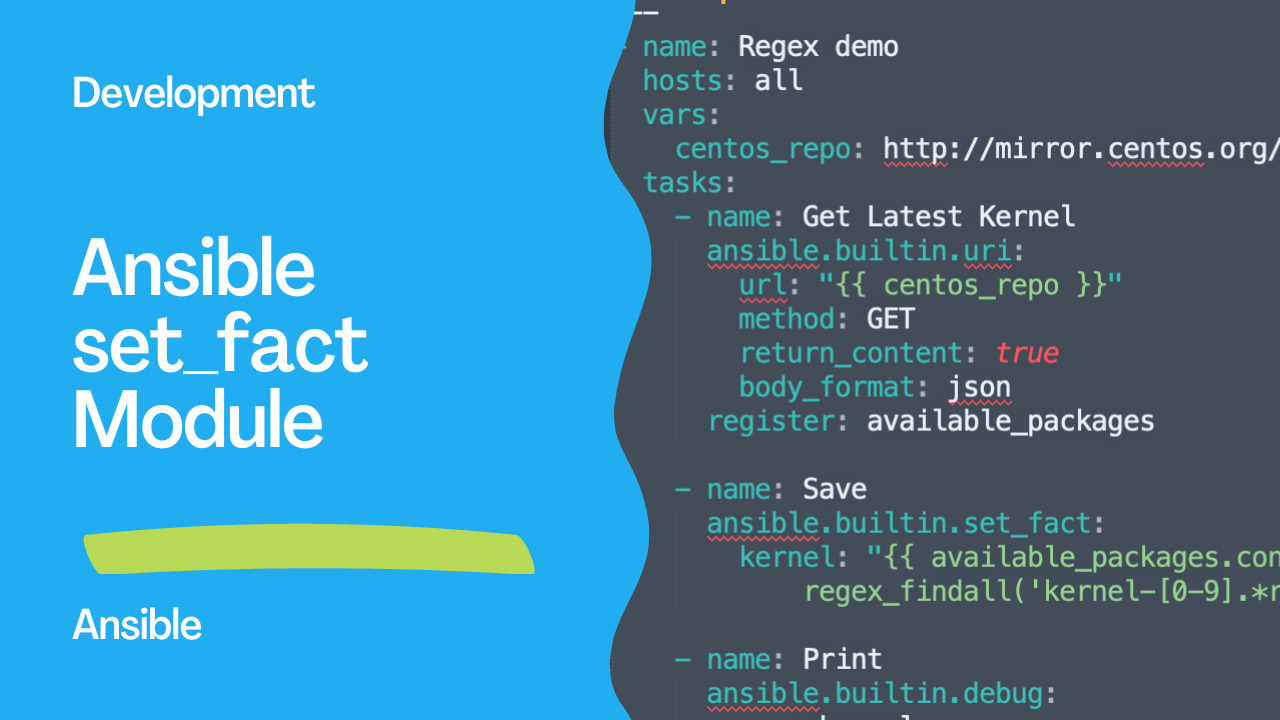Exploring Ansible’s set_fact Module with Example
Ansible is an open-source automation tool widely used for configuration management, application deployment, and orchestration. It simplifies the process of managing IT infrastructure by allowing you to define desired state configurations in a declarative manner. One powerful feature of Ansible is the set_fact module, which enables you to create or modify variables dynamically during playbook execution. It is part of the ansible.builtin collection.
Links

Demo
In this article, we will explore the set_fact module and its usage through a practical example. We will Playbooknstrate how to retrieve the latest kernel package from a CentOS repository using Ansible’s uri module and store it in a variable called kernel. Let’s dive into the code example:
---
- name: Regex Playbook
hosts: all
vars:
centos_repo: http://mirror.centos.org/centos/7/os/x86_64/Packages/
tasks:
- name: Get Latest Kernel
ansible.builtin.uri:
url: "{{ centos_repo }}"
method: GET
return_content: true
body_format: json
register: available_packages
- name: Save
ansible.builtin.set_fact:
kernel: "{{ available_packages.content | ansible.builtin.regex_replace('<.*?>') | regex_findall('kernel-[0-9].*rpm') }}"
- name: Print
ansible.builtin.debug:
var: kernel
Let’s break down this playbook step by step to understand its functionality:
The
namedirective gives our playbook a descriptive title, “regex Playbook.”The
hostsdirective specifies the target hosts on which the playbook will be executed. In this case, it’s set toall, meaning it will apply to all hosts in the inventory.The
varssection allows us to define variables used within the playbook. Here, we set thecentos_repovariable to the URL of the CentOS 7 package repository.The
taskssection contains the actual work to be performed. We have three tasks defined.The first task, named “Get Latest Kernel,” uses Ansible’s
urimodule to send an HTTP GET request to thecentos_repoURL. It retrieves the content of the repository in JSON format and stores it in theavailable_packagesvariable using theregisterdirective.The second task, named “Save,” utilizes the
set_factmodule. It takes the content stored inavailable_packagesand applies two filters consecutively. First, it uses theregex_replacefilter from theansible.builtinplugin to remove any HTML tags from the content. Then, it applies theregex_findallfilter from the same plugin to extract the kernel package names matching the pattern “kernel-[0-9].*rpm.” The resulting list of kernel package names is stored in thekernelvariable using theansible.builtin.set_factmodule.The third task, named “Print,” uses Ansible’s
debugmodule to display the value of thekernelvariable.
By leveraging the set_fact module, we dynamically extract the kernel package names from the repository content and assign them to the kernel variable. This approach allows us to utilize the extracted data for further operations within our playbook or inventory.
Conclusion
In summary, the set_fact module is a powerful tool in Ansible for creating or modifying variables dynamically during playbook execution. It enables us to extract, transform, and store data from various sources, making it available for subsequent tasks or playbooks. In our example, we used set_fact to extract the latest kernel package name from a CentOS.
Academy
Learn the Ansible automation technology with some real-life examples in my
Udemy 300+ Lessons Video Course.

My book Ansible By Examples: 200+ Automation Examples For Linux and AWX System Administrator and DevOps

Donate
Want to keep this project going? Please donate
